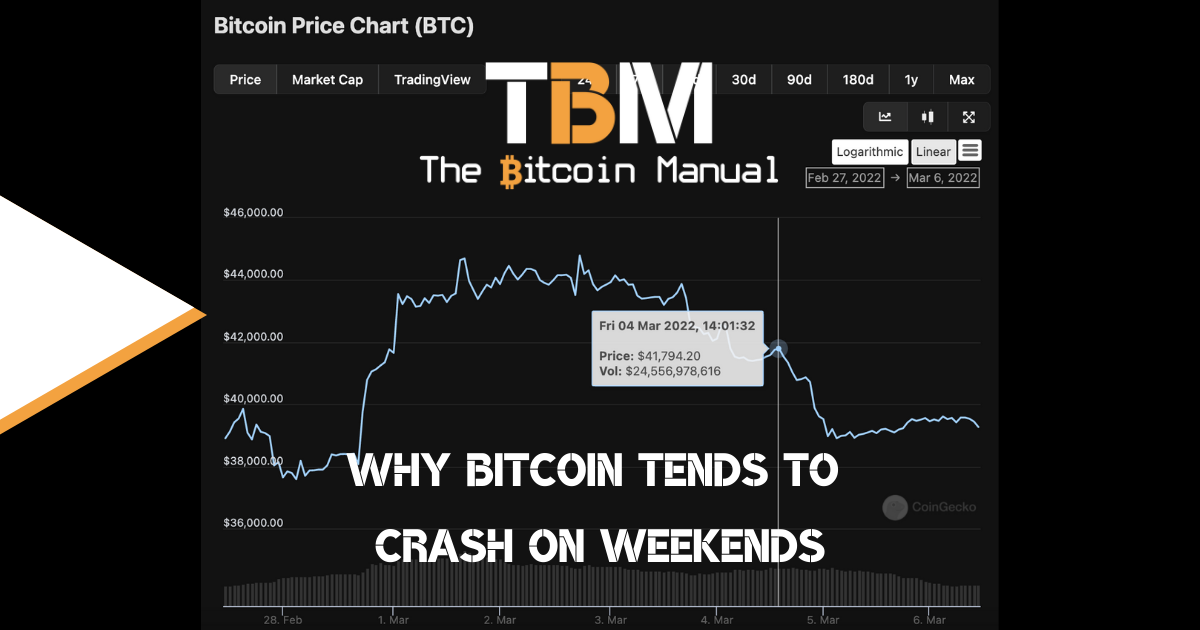If you’ve ever wasted a considerable amount of your life looking at a bitcoin chart trying to make heads or tails of it, then you’ve probably noticed that the price tends to trend downwards on weekends. This is by no means an absolute rule that bitcoin ALWAYS follows, but most boring weekends, with no big news, should see the price trade lower than the weekday averages.
Bitcoin is known for volatility, so price movements aren’t unexpected, especially on weekends. Having an asset trading globally 24/7 with 180 currency pairs and the volatility coming from the more illiquid altcoin market means there are tonnes of forces flowing in and out of bitcoin and can cause gyrations in the price.
Bitcoin is still a small market at less than a trillion dollars in market cap, and with so many avenues plugging in to push capital in and out, it will reflect in price movements and high volatility. When we also there is no way to put the breaks on a bitcoin market, regulators are powerless in their bid to dampen volatility like they can with other financial assets.
Now that you understand the landscape bitcoin trades under let’s look at some possible influencers that result in price dips and crashes happening over weekend trading days.
Less trading on weekends
One of the reasons for weekend bitcoin volatility is there are simply fewer people active in the market and making trades. Not all of us want to spend our weekends looking at charts and trying to make money; most of us prefer to enjoy our downtime and keep to working on the weekdays. It’s a behaviour that most people subscribe to, so with less active participants trading, once someone comes to sell a reasonable amount of bitcoin, there are fewer buy orders to absorb the sell order.
When we consider that banks closed over the weekend, there is less trading because investors may not be able to fund their accounts as quickly as they would like or may have delays with funds clearing into exchanges.
Trading on margin
Another possible reason for weekend price swings may be investors trading bitcoin on margin. Margin trades involve borrowing money from the exchanges to buy more assets, to ramp up exposure and hopefully secure a larger profit on a winning trade. Unlike traditional markets, bitcoin margin trading can get out of hand, with some exchanges offering up to 100 times leverage.
As you can imagine, with that amount of financing from an exchange, if a trade goes against you, it can quickly cause cascading liquidations.
When bitcoin prices dip below a certain level, traders must repay the loan, commonly known as a “margin call.”
But if investors don’t cover the loan, exchanges may sell their bitcoin to ensure they receive the borrowed money back. In addition, with banks closed over the weekend, some traders may struggle to find ways to access capital to pay the margin call/pay off the borrowed funds to hold their position. If a trader can’t move money into their accounts, exchanges will call in the loan triggering mass sell-offs from exchanges offering margin trading.
Market manipulation
Bitcoin is not a regulated market, and when you’re trading in the wild west, you’ll find characters trying to exploit certain loopholes. It’s possible that there are some trades trying to artificially influence bitcoin prices may be a factor. There are a lot of studies on spoofing trades on exchanges setting buy or sell orders that will never be filled to try and spook traders out of positions.
Spoofing trades can also be seen as a way to influence bitcoin prices by creating a false sense of supply and demand.
Bitcoin ETFs
Bitcoin spot ETFs are avialable in select countries such as Brazil and Canada; when these funds are trading, they offer reasonable buying pressure for the market, but these funds don’t trade 24/7. When Bitcoin ETF trading desks are closed for the weekend, that buying pressure is no longer available to come in and provide a floor for sellers.
Arbitraging
As mentioned earlier, during the weekend, there are fewer traders actively participating in the market; this is true for markets and trading pairs all over the world. While larger markets like the USD/BTC may have reasonable capital flows, other trading pairs, let’s say GBP/BTC, EUR/BTC or JPY/BTC, may not have as much liquidity, and as a sell order hits, it pushes that pair trade well below the other markets prices.
Arbitrage firms and bots move into gobble up that premium, pulling away funds from other markets, which can result in a downward trend in other markets too.
Stacking the cheapest sats
If you’re committed to stacking and you’re thinking of ways to make that ever depreciating fiat stretch a little bit further, you may want to consider setting some limit orders over the weekend. Check your current ranges bitcoin trades in and the order book of your local exchange for possible lower bounds and place your bets, and hope your orders get filled.
Having your orders filled won’t always be the case, but you’ll be surprised at how some weekends you can pick up a flash crash bargain.




